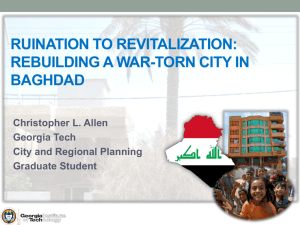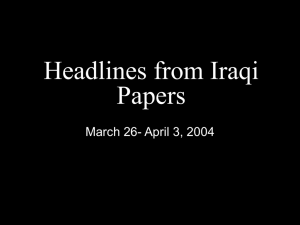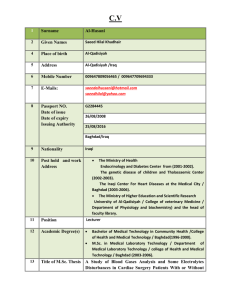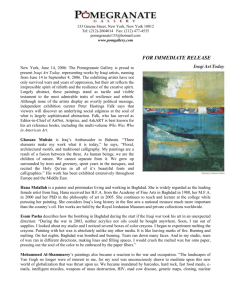Living in a City Under Siege
advertisement
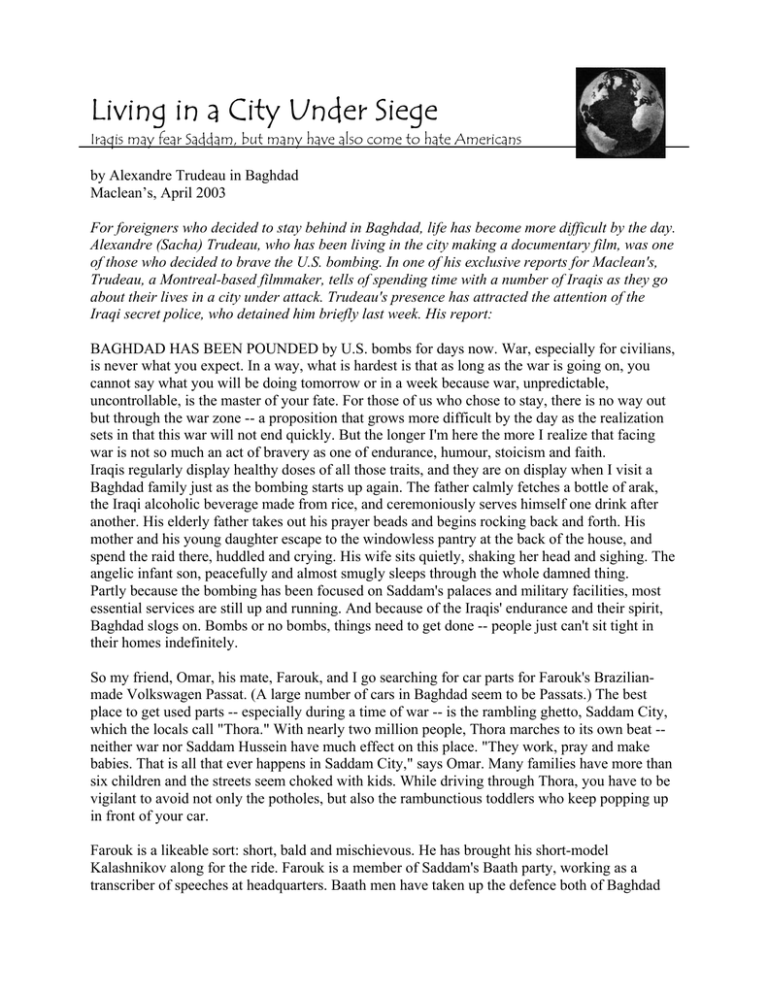
Living in a City Under Siege Iraqis may fear Saddam, but many have also come to hate Americans by Alexandre Trudeau in Baghdad Maclean’s, April 2003 For foreigners who decided to stay behind in Baghdad, life has become more difficult by the day. Alexandre (Sacha) Trudeau, who has been living in the city making a documentary film, was one of those who decided to brave the U.S. bombing. In one of his exclusive reports for Maclean's, Trudeau, a Montreal-based filmmaker, tells of spending time with a number of Iraqis as they go about their lives in a city under attack. Trudeau's presence has attracted the attention of the Iraqi secret police, who detained him briefly last week. His report: BAGHDAD HAS BEEN POUNDED by U.S. bombs for days now. War, especially for civilians, is never what you expect. In a way, what is hardest is that as long as the war is going on, you cannot say what you will be doing tomorrow or in a week because war, unpredictable, uncontrollable, is the master of your fate. For those of us who chose to stay, there is no way out but through the war zone -- a proposition that grows more difficult by the day as the realization sets in that this war will not end quickly. But the longer I'm here the more I realize that facing war is not so much an act of bravery as one of endurance, humour, stoicism and faith. Iraqis regularly display healthy doses of all those traits, and they are on display when I visit a Baghdad family just as the bombing starts up again. The father calmly fetches a bottle of arak, the Iraqi alcoholic beverage made from rice, and ceremoniously serves himself one drink after another. His elderly father takes out his prayer beads and begins rocking back and forth. His mother and his young daughter escape to the windowless pantry at the back of the house, and spend the raid there, huddled and crying. His wife sits quietly, shaking her head and sighing. The angelic infant son, peacefully and almost smugly sleeps through the whole damned thing. Partly because the bombing has been focused on Saddam's palaces and military facilities, most essential services are still up and running. And because of the Iraqis' endurance and their spirit, Baghdad slogs on. Bombs or no bombs, things need to get done -- people just can't sit tight in their homes indefinitely. So my friend, Omar, his mate, Farouk, and I go searching for car parts for Farouk's Brazilianmade Volkswagen Passat. (A large number of cars in Baghdad seem to be Passats.) The best place to get used parts -- especially during a time of war -- is the rambling ghetto, Saddam City, which the locals call "Thora." With nearly two million people, Thora marches to its own beat -neither war nor Saddam Hussein have much effect on this place. "They work, pray and make babies. That is all that ever happens in Saddam City," says Omar. Many families have more than six children and the streets seem choked with kids. While driving through Thora, you have to be vigilant to avoid not only the potholes, but also the rambunctious toddlers who keep popping up in front of your car. Farouk is a likeable sort: short, bald and mischievous. He has brought his short-model Kalashnikov along for the ride. Farouk is a member of Saddam's Baath party, working as a transcriber of speeches at headquarters. Baath men have taken up the defence both of Baghdad and of their leader, and these days they are always armed. Omar, on the other hand, is the furthest thing in the world from the Baath party. He truly hates politics, and all the more the severe, sectarian club which is the Baath. Whatever chance he gets, he teases Farouk about his allegiances. But these two are drinking buddies and have known each other for so long that nothing between them is sacred -- not religion, not politics. As we drive, the radio blasts a hawkish, monotonous speech from an Iraqi defence ministry hack who is announcing all the (fictitious) victories against the Americans in the battles of the south, and declaring that it is only a matter of time before the invaders are cast out of Iraq. Farouk nods and, suddenly unable to contain himself, cries out: "Inshallah!" -- if Allah wills it. Omar winks at me sarcastically. Farouk then lifts up his weapon and chants a proSaddam slogan. Omar answers with a big, decisive raspberry. We all burst out laughing. PART OF THE DEFENCE of Baghdad, part of the drama, are the massive oil pits that the Iraqi army has constructed on the outskirts. When lit, they fill the sky with thick smoke in a bid to prevent the attackers from pinpointing the location of Iraqi troops and other targets. Under this gloomy veil, Baghdad is bathed in an eerie, yellowish light. A middle-class area known as New Baghdad is shrouded in what seem to be the darkest clouds of smoke. There, I visit a comfortable Shia family; with customary Arab warmth and grace, big Hassan, a local merchant, shows me into his home. Snickering, he points to his sons who are busy playing the video game Medal of Honor: an American commando single-handedly machine-gunning his way through hordes of faceless foes. On the wall above them, a not-so-common sight in a private house: a portrait of Saddam. "How do you like the war?" Hassan asks me with a smile. "Very strange," I inadequately answer. "You just wait," he says. I don't know what he means, but I can't help but think of the mantra, "We are not afraid," which I have heard countless Iraqis utter over and over before and since the bombing began. THESE DAYS, there are ghosts in the capital. In an echo of Gen. Tommy Franks's claim that American agents are already operating in and around Baghdad, many in the city are anxious to catch a spy. In one surreal episode, hundreds of police and soldiers scour the banks of the Tigris River for two U.S. pilots they believe have been shot down over the city. Later, in New Baghdad, a man tells me an Iranian, posing as an Iraqi soldier, has been caught. "We could tell he wasn't Iraqi by the boots he was wearing," the man says. "What happened to him?" I inquire. "The knife," he answers bluntly. Then Farouk reports that an American has been captured in the Daura neighbourhood. "They turned him in dead," Farouk says grimly. "That's worth 25 million dinar [$12,500]. Alive, the enemy soldiers are worth 50 million dinar [$25,000]." Then Omar adds dryly, "If the Americans ever pay for Iraqi soldiers, I will turn in Farouk." Foreigners in the city are increasingly under suspicion as the war grinds on. As I sit in a restaurant in a remote part of Baghdad, casually eating a sandwich, I'm pounced upon by some Baath heavies. Before long, policemen and soldiers are interrogating me. I'm carted off to an imposing, grey-haired secret police boss, standing like a Titan in front of his station. "Where were you when you were caught?" he roars, looking me up and down. "In a restaurant," I answer meekly. "What were you doing?" he demands. "Having lunch," I reply. He pauses, then bursts out in thunderous laughter. "Get out of here," he shouts with a huge smile. I scramble off -happy to have had the experience, relieved to have come out of it unscathed. Perhaps I was released because police loyal to Saddam in Baghdad have been buoyed by the news that the U.S. advance toward the city has been slowed. It's not the cakewalk the Americans were counting on. Rather than giving up and greeting their would-be liberators with jubilation, many Iraqi soldiers and militiamen are actually shooting at them. The invaders can expect even more resistance when they reach the city, where a large number of gunmen of all sorts are digging in: Baath soldiers, the paramilitary Fedayeen troops loyal to Saddam's son Uday, the Republican Guard and armed civilians. I don't think Iraqis themselves were aware until recently how they would react to this war. Now, more and more know. Their sense of endurance, which allows them to laugh and live under the bombs, might well be put to harsher purposes. Miriam, an amazing woman I met who speaks perfect English, hints at what may come. Her father is a scientist; Miriam, who was a teacher and is now married with children, spent part of her teenage years in the United States when he was doing post-doctoral research. While having lunch at her house, we hear on the radio that an American Apache helicopter has been shot down about 80 km south of Baghdad. "Good," Miriam proclaims. "I am not going to shed any tears for Saddam's palaces. But I will shed even less for American attack helicopters." She continues: "It is not about the president, not about the regime. It is about our pride. This is our country." Farouk expresses this sentiment in even stronger terms. "We are fighting for the Iraqi soul," he says. "Of course we will put up a great fight."
